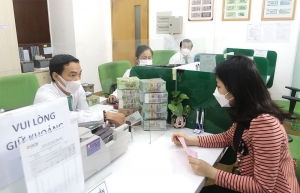Investors and buyers play waiting game in credit switch
Earlier this month, the State Bank of Vietnam (SBV) adjusted the credit growth target in 2022 for some institutions that had requested such a move. The adjustment of credit limit is based on the assessment of the operation of credit institutions and must also contribute to controlling inflation and stabilising the currency market.
Among banks with increased credit room, Sacombank was offered 4 per cent, Agribank 3.5 per cent, Maritime Bank at 3.2 per cent, Vietcombank with 2.7 per cent, and TPBank offered 1.2 per cent.
The SBV said that the opening of the credit room is to facilitate the implementation of a 2 per cent interest rate support package as well as to meet the capital needs for socioeconomic development and restoration of production and business.
Needing a loan worth about $43,000 from a bank to buy a house, Nhu Quang from the south-central province of Binh Thuan told VIR that, after learning that the banks were to extend credit, he contacted his target commercial bank. He had been trying for months to apply for a loan. “The bank said I still have to wait longer because detailed instructions have not been released yet,” Quang said.
Similarly, Tran Thi Thanh from Ho Chi Minh City’s Thu Duc city said that her family has bought a unit for over $100,000 and has completed procedures for a bank loan of 60 per cent of the value of the unit. Previously, some banks did not accept loans because they said they were out of credit room. Last week, Thanh returned to those banks, but the bank still refused.
“The bank said their credit growth and disbursement remain under the control of the SBV and consumers like us who want to buy a house still cannot get a loan,” said Thanh.
Representatives from some banks commented that the extension is actually the SBV’s redistribution of credit growth limit in the remaining percentage of this year’s target of 14 per cent. However, banks have been waiting for this for several months. Immediately after the information was released, many banks were speeding up their consideration for previous loan applications.
 |
| Experts say that the potential for capital inflow in the short term in areas like Ho Chi Minh City is not too large, photo Le Toan |
Vibrant market
According to Hoang Van, an independent real estate expert, real estate prices have been pushed up to a very high level in recent times. This forces buyers to wait and see, expecting a reducing wave. In addition, the deposit interest rate and lending interest rate of banks are also increasing sharply, worrying potential investors and buyers.
“Therefore, it is unlikely that the real estate market will be active immediately after the credit room loosening is in effect. Instead, the real estate market will develop in a more substantive and sustainable way. Capital will flow into real estate segments with real needs and meeting the expectations of homebuyers,” Van said.
Real estate projects of good quality and developed by reputable developers and affordable for customers may still have good growth potential. However, according to Nguyen Hung, an individual investor in Ho Chi Minh City, this is simply an emotional factor of investors in the market.
“The policy from the government needs a while before being put into operation. The extension of the credit room was applied to only a few banks, so it cannot help businesses and people in new credit sources,” Hung explained. “Moreover, this room extension is not only for real estate but also for other industries, so the impact on the market is not substantial.”
Insiders and experts insisted, however, that some good will come from the move. Dr. Le Xuan Nghia, former vice chairman of the National Financial Supervision Commission, assessed that loosening credit at this time was a wise decision. “Maintaining the stability of monetary policy is the most appropriate move of the executive agency in this period,” Nghia said.
Experts from SSI Securities also said that credit loosening can help enterprise owners have more capital to pay debts and mature bonds, especially small- and medium-sized enterprises. Meanwhile, large enterprises that still have collateral for bank loans will be eligible to issue new bonds as well as borrow international bonds.
Vu Kim Giang, general director at Hai Phat Land, said that the expansion of the credit room, although indirectly, will also have a very positive impact on the cash flow of real estate businesses and create room for the market to redevelopment.
“The real estate market is expected to warm up again in the last months of the year when credit flows open and businesses free up inventories,” said Giang.
Proactive need
Le Hoang Chau, chairman of the Ho Chi Minh City Real Estate Association, explained that the potential for capital inflow in the short term is not too large, with the main reason being that the banking sector has spent too much capital on real estate in recent times.
“The current expansion of the credit may only be a psychological impact to help the real estate market recover a bit, but it is not enough to help the market to accelerate. The low credit limit will not be enough to meet the stockpile of loan applications, making it difficult to revive the quiet market,” said Chau.
To create more conditions for the real estate market to develop actively, Can Van Luc, a member of the National Monetary Policy Advisory Council, said that in the context of macroeconomic stability and inflation control, the SBV can completely expand the credit room for the whole of 2022 by 1-2 per cent more. This means increasing from the target level of 14 per cent to 15-16 per cent.
“Doing this will have a stronger and more substantive impact on the real estate market, especially in the context that the market has been facing difficulties in terms of capital from the beginning of 2022, and the end of the year is also the peak time for the real estate market,” Luc said.
He added that if the capital source is not cleared soon, businesses will continue to face difficulties in project implementation, and customers will also have difficulty accessing home loans.
“As a result, the real estate market is illiquid, and mutual debts of businesses and bad debts of banks will increase. This is extremely dangerous, not only for the real estate market but also for the economy as a whole,” he added.
To solve the problem of capital for the current real estate market, Luc said that the most important issue for real estate businesses right now is to diversify their capital sources.
“In addition to the three main sources of mobilisation – bank credit, corporate bonds, and homebuyers – real estate businesses need to be flexible in mobilising from other channels such as private placement for strategic shareholders, offering shares to the public and existing shareholders, from investment funds, and other financial institutions,” he added.
Besides diversifying capital sources, businesses also need to improve themselves towards transparency in completing credit records and securities documents, implementing commitments, and strengthening risk management to cope with interest rate and exchange rate risks that may arise, Luc said.
| Dinh The Hien, Economist
The current difficulties show that real estate businesses can hardly rely on capital flows from two main channels: banks and sales volume. Therefore, many project developers are tending to restructure their products, reduce investment in the localities, and keep their products close to the centre and suburban areas to ensure liquidity. The most important issue of real estate businesses right now is to diversify capital sources. Accordingly, businesses need to actively set up and improve their credit profile in the capital market, aiming for an optimal capital strategy instead of mobilising new funds until the demand arises. Along with that, investors need to speed up the diversification of domestic and foreign loan sources, creating favourable conditions for buyers by adjusting payment terms in line with credit limits from banks. Capital source from prepaid buyers is also a remarkable channel for them right now. Tran Khanh Quang, CEO, Viet An Hoa
The loosening of credit room at large retail banks may create some opportunities for homebuyers, but in general, banks are still cautious and limited for medium-sized project investors so the opportunity is not for the entire real estate market. The additional expanded credit is relatively small, with priority given to production and business enterprises that are stuck with working capital in recent months, so the portion for homebuyers will be limited. This expanded credit is also expected to be sold out soon in a short time of 8-12 weeks, so it is only likely symbolic. Therefore, this is only a psychological impact to help real estate to become a little brighter, but it does not play a role in helping the market to accelerate. Cao Huu Phi - General director, COPIHOME
Since the end of April, many homebuyers have had difficulty with loan access. The majority of investors are in a state of waiting for the bank to disburse before deciding to buy assets. But how to disburse in the near future is still a big question. Because there is not much room for lending and from now until the end of the year, real estate buyers will not have easy access to loans as expected. It is necessary to wait for more movement in real estate lending from the real market after loosening the room to assess the impact. But with a large number of homebuyers with real needs waiting for disbursement in the past time, I am afraid that the upcoming loan space is quite modest, and not commensurate with the demand. David Jackson - CEO, Colliers Vietnam
From a macroeconomic perspective, I think the act of allowing more room for loans from the State Bank of Vietnam has shown a timely and flexible effort to stabilise the market. In the context of economic recovery, I understand that the Vietnamese government is doing its best to support and sustain essential business activities such as manufacturing and investments. Amid prolonged global challenges such as supply chain disruption, the energy crisis, inflation, and surging costs, it is crucial for Vietnamese policymakers to minimise unwanted impacts from external factors on the real estate market and ensure sustainable developments in the long run. The recent news of credit loosening is expected to boost the investment sentiment amongst those who have been waiting for the approval of their financial leverages. The next step is how this resolution is put into practice, helping to direct the flow of capital to where highly needed, and somewhat easing the pressures on the real estate market. Vo Hong Thang-Deputy director of Research and Development, DKRA Group
Real estate businesses have begun to absorb great pressure on capital after fluctuations in the corporate bond market. Although the State Bank of Vietnam has just loosened the credit room for some commercial banks, it is not enough to cover the loan demand that has been lined up for a few months. Real estate developers need to take many different measures to solve the difficulties in raising capital at this time. Some solutions investors and project developers can consider include mobilising capital from domestic and foreign investment funds in the form of loans or investment cooperation. They also need to be ready for merger and acquisition plans, working with investors with strong financial potential to cooperate in project development. In addition, enterprises need to focus resources on legally completed projects, avoid spreading investment, and prolong the implementation schedule which will increase the cost burden. Furthermore, they should consider issuing green bonds, mobilising capital for environmental protection activities, utilising solutions to combat climate change, and finally, restructuring businesses in an efficient way to optimise operating costs. |
 | Loosened credit may not be enough for real estate capital While the State Bank of Vietnam (SBV) has expanded credit limits for several banks, the stricter control of credit in areas like real estate may impact project liquidity in the sector. |
What the stars mean:
★ Poor ★ ★ Promising ★★★ Good ★★★★ Very good ★★★★★ Exceptional
Related Contents
Latest News
More News
- Construction firms poised for growth on public investment and capital market support (February 11, 2026 | 11:38)
- Mitsubishi acquires Thuan An 1 residential development from PDR (February 09, 2026 | 08:00)
- Frasers Property and GELEX Infrastructure propose new joint venture (February 07, 2026 | 15:00)
- Sun Group led consortium selected as investor for new urban area (February 06, 2026 | 15:20)
- Vietnam breaks into Top 10 countries and regions for LEED outside the US (February 05, 2026 | 17:56)
- Fairmont opens first Vietnam property in Hanoi (February 04, 2026 | 16:09)
- Real estate investment trusts pivotal for long-term success (February 02, 2026 | 11:09)
- Dong Nai experiences shifting expectations and new industrial cycle (January 28, 2026 | 09:00)
- An Phat 5 Industrial Park targets ESG-driven investors in Hai Phong (January 26, 2026 | 08:30)
- Decree opens incentives for green urban development (January 24, 2026 | 11:18)






 Tag:
Tag:





















 Mobile Version
Mobile Version